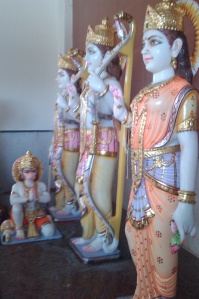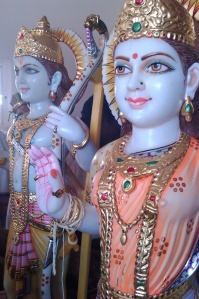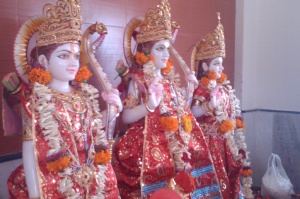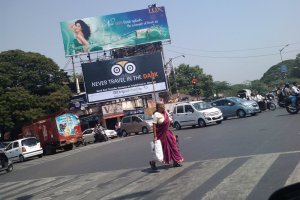Coming back to America was, for me, much more of a cultural shock than going to India. The people in the Indian countryside don't use their inlellect like we do, they use their intuition instead, and their intuition is far more developed than in the rest of the world. Intuition is a very powerful thing, more powerful than intellect, in my opinion. That's had a big impact on my work.
Western rational thought is not an innate human characteristic; it is learned and is the great achievement of Western civihzation. In the villages of India, they never learned it. They learned something else, which is in some ways just as valuable but in other ways is not. That's the power of intuition and experiential wisdom.
Coming back after seven months in Indian villages, I saw the craziness of Western world as well as its capacity for rational thought.
Musings from India about Movies, Music, Startups, Technology, Travel and Photography...
Sunday, October 30, 2011
Steve Jobs on India [From the Exclusive Biography]
Tuesday, October 25, 2011
Tuesday, September 27, 2011
Quick Guide to Do Not Disturb Registry #DND #TRAI #India
As per Telecom Regulatory Authority of India (TRAI) regulation, mobile consumers will be freed from unwarranted calls and SMS from 27th Sept 2011.
This was long overdue - but now has come into effect. Accordingly, the Do Not Disturb registry has been renamed to National Consumer Preference Register. Every telemarker needs to register itself with TRAI (Check registered telemarketers in your district here). Click here to know more about the changes.
Now consumers can choose to block all calls-SMS or choose which calls-SMS they wish to receive. Further, one can change his/her preferences after 7 days compared to 3 months earlier.
People who have already added themselves to DND will be automatically treated to have blocked ALL calls and SMS.
To know your current status, go here and enter your number.
Here is a quick guide to update your preferences via SMS:
You can register your preference(s) for commercial communications by sending an SMS to 1909.
Basically, there are 7 categories of registered telemarketers:
1. Banking/Insurance/Financial products/credit cards,
2. Real Estate,
3. Education,
4. Health,
5. Consumer goods and automobiles,
6. Communication/Broadcasting/Entertainment/IT,
7. Tourism and Leisure.
To partially block, you need to simply send an SMS to 1909 in following format:
START <number of desired category from above>
For example, to receive calls/SMS from Banks and Credit Cards, send following SMS to 1909 -
START 1
You can also send the SMS in following format for multiple categories -
START 1,3,4
To block everything (which is not recommended), send following SMS to 1909 -
START 0
Remember that START 0 supercedes all other options.
Also, remember that the shipment information about items from an eCommerce website are included in category no. 5 i.e. Consumer goods and automobiles. So you may want to receive SMS from this category.
What happens after one sends the SMS?
Basically, you will receive an SMS about confirming the options you have selected. Once you confirm that by sending a confirmation SMS, your preference will be registered and you will get an SMS with a registration number (keep it safe, you may need it).
START x STOP
You can similarly, use STOP to opt put of the whole blocking thing (if you are ok with all the calls and SMS). Just replace START with STOP in above instructions to bring this into effect.
Saturday, September 24, 2011
Economics of Happiness [Must Read] #Economy #Capitalism
Stumbled upon this nice piece by Jeffrey Sachs as he thinks this is an apt time to -
....reconsider the basic sources of happiness in our economic life. The relentless pursuit of higher income is leading to unprecedented inequality and anxiety, rather than to greater happiness and life satisfaction.
He goes on to present conclusions drawn by a gathering of experts in Thimphu - the happiness capital of world.
Third, happiness is achieved through a balanced approach to life by both individuals and societies. As individuals, we are unhappy if we are denied our basic material needs, but we are also unhappy if the pursuit of higher incomes replaces our focus on family, friends, community, compassion, and maintaining internal balance. As a society, it is one thing to organize economic policies to keep living standards on the rise, but quite another to subordinate all of society’s values to the pursuit of profit.
Yet politics in the US has increasingly allowed corporate profits to dominate all other aspirations: fairness, justice, trust, physical and mental health, and environmental sustainability. Corporate campaign contributions increasingly undermine the democratic process, with the blessing of the US Supreme Court.
Tuesday, September 20, 2011
Monday, September 19, 2011
Amazing Idea from Korea! A Must see... [Video]
These stores are operated by Homeplus a Korean retailer. According to Wikipedia, Home plus is jointly owned by Samsung and Tesco (a British company) with 113 branches throughout South Korea.
Will these be successful in India?
A top comment on the Youtube page of the video may indicate what may happen in India -
Idea: instead of wasting time scanning the products, visit the online shop of a supermarket website while you're on the train. It's better than a whole crowd standing in front of those walls, punching??? with their elbows just to take pics...
Tuesday, September 6, 2011
What's the Job of Government?
A must read article. Reminded me how the food crisis debate ended up in lobbying for FDI in retail sector. Read to know how govt is failing in the basic job - judicial allocation of resources.
Some excerpts -
In recent years, the financial markets have discovered the huge opportunities presented by agricultural commodities. The consequences are devastating, as speculators drive up food prices and plunge millions of people into poverty. But investors care little about the effects of their deals in the real world.
The problem is particularly glaring in Ethiopia, a country whose name is associated with starvation for many people. Even though 5.7 million Ethiopians are dependent on international food aid, the government sells or leases large tracts of fertile land to foreign investors. They, in turn, export most of the food they produce to other countries. Since 2007, the Ethiopian government has approved 815 foreign-funded agricultural projects. Saudi firms, multinational agricultural companies and British pension funds act as investors. Some 3.6 million hectares of land are up for grabs, much of it in the Gambela region, the proposed site of a national park. Now virgin forest is being cleared to produce food for other countries. Fifty kilometers (31 miles) outside the capital Addis Ababa, Jittu Horticulture, a subsidiary of a Spanish agricultural group, produces 180,000 kilograms (396,000 pounds) of vegetables a week. The produce is exported to the Middle East, supplying multinational oil companies and five-star hotels in Dubai, Qatar, Bahrain and Saudi Arabia. "We bring foreign currency into the country, enabling the government to buy wheat for the hungry," Dutch manager Jans Brins told the Berlin daily newspaper Tagesspiegel. "It's the government's responsibility to feed people who are unable to buy anything for themselves."
According to the UN assessment, what is needed is a reorientation toward a system of agriculture driven by small farmers who grow their crops at the local level, using both sustainable and environmentally compatible methods. The authors argue that through investment, these farmers must be given access to seeds, infrastructure, knowledge and markets -- and thus the opportunity to feed themselves and others. In their view, this is the only way to preserve the natural basis of feeding human beings and fight world hunger.
The original article - Speculating with Lives: How Global Investors Make Money Out of Hunger
Sunday, June 19, 2011
Thoughts About India
Some links which are in tune with what's on my mind...
1. India's Costly Culture of Corruption [Steven Pearlstein in Washington Post]
"These are all reminders that, for all its progress in recent years, India’s economy remains very much an insider’s game. A recent study by two American business school professors confirmed that much of the formal economy continues to be run by a couple dozen family-controlled groups that seem to be in just about every major industry — manufacturing, retail, energy, infrastructure, shipping, construction and telecom."
2. India Inc is not a small crony club [Swaminathan A Aiyer in Times of India]
This is a serious and common criticism, but is mostly wrong. Consider the sensex between 1990 (just before economic liberalization) and today. The sensex comprises the 30 top stock market companies, and the Bombay Stock Exchange keeps changing companies in the list as old giants decline and new ones emerge. If indeed India was dominated by a few oligarchs, the sensex would contain much the same companies today as it did 20 years ago.
3. New India story is about flight of capital [Swapan Dasgupta in Times of India]
From sweetheart deals in telecom and offshore exploration to the ouster of reluctant farmers from their lands, corporate India is being painted the root of all evil. It has become the new juju man—the puppeteer controlling a range of subordinate players ranging from bent bureaucrats to pliant politicians.
The first story above tells what is on mind of everybody in India. Second is a repudiation of the first argument - though a flawed one in my view. The third one, like the second tries to defend big coroporates in India from the recent public outcry - again a meek attempt.
The truth is that India has become a corrupt society. Everyboy knows this. The rich and powerful benefit from it. Everybody else suffers - the biggest loss being the that of opportunity.
Wednesday, June 1, 2011
Ram Temple Near Home
A few days ago, the idols of Shri Ram, Lakshman, Sita and other deities were finally installed in the newly constructed temple in the housing society where I live in Pune. Some snaps -
Tuesday, May 31, 2011
Basic [and Witty] Rule of Online Security
And God said, "Trust not the tinyurl, for it is subtle and quick to abuse your trust."And it came to pass, that Robert did click the tinyurl and was assaulted from behind by gay pr0n popups.And God said, "wtf? I told you..."-The Book of Stein
Thursday, May 19, 2011
A Very Apt Quote by Carl Jung

"If people can be educated to see the lowly side of their own natures, it may be hoped that they will also learn to understand and to love their fellow men better. A little less hypocrisy and a little more tolerance toward oneself can only have good results in respect for our neighbors, for we are all too prone to transfer to our fellows the injustice and violence we inflict upon our own natures."
--
I found this quote very apt about the way we deal with the not-so-bright sides of hostorical figures and leaders. Case in point is the intolerent and hasty reactions towards 'failed-to-understand-the-cultural-tones' claims about homoerotic relationship of Mahatma Gandhi.
He is a great inspite of such true-false discoveries. Isn't it?
Sunday, April 24, 2011
Friday, March 4, 2011
Tuesday, February 22, 2011
Thursday, February 10, 2011
ForbesLife Launches - Looks Good (and familiar!)
Forbes India recently launched a very high end magazine ForbesLife India - a quarerly magzine which costs Rs. 200. Nice range of content and a visual treat. However, it reminded us of a magazine which my friend Amit - a journalist and entreprenuer - had picked up in South Africa almost 4 years ago. Since we are in same business of content generation and design, for a trained eye the similarities are too stark to go unnoticed. The dimensions of magazine (size), paper quality, design elements, content strcuturing bear striking resemblence with the South Africal magazine 'Monocle'. [Click the link to read about the latest issue of 'Monocle'.] Here is the link to the subscription page of the latest issue of ForbesLife India.
And yes, they both have a picture story!!
Offcourse, this might not be plagiarism because we do not know. But huge resemblence - yes!!
Here are some links which you may find interesting -
Cover Versions - How dare ‘a little magazine’ accuse Forbes India of plagiarism!
And view of a fellow Twitterer http://twitpic.com/3m9kb1
Sunday, January 23, 2011
This dominating, awesome Shirish tree
Summer seems just around the corner and winter is almost over.
The tree has started shedding its leaves to welcome yet another summer...so it is almost snowfall of thousand leaves with every breeze of wind.
Lucky to have such a beautiful location for workplace in Pune!
Saturday, January 22, 2011
History of Microsoft Excel [Videos]
[Update: Excel turned 25 a few days ago!]
Office - Excel is one the most awesome piece of softwares ever written. Here is its history -
Part I:
[youtube http://www.youtube.com/watch?v=ZodlyeiQeIo]
Part II:
[youtube http://www.youtube.com/watch?v=D2PgYGK85lI]
Sunday, January 16, 2011
Why India Is Corrupt?
Can we trace the reason of corruption in Indian society to her culture? Is there any correlation between a highly religious society (Catholics, Hindu) and high levels of corruption?
These are some of the interesting questions asked by Aakar Patel in his piece in Mint today.
Though anybody would agree that corruption is not so simple a phenomenon, there seems to be atleast some truth in what he has hypothised in the article. Ambiguity or complexity or dogmatism in religious code can be a reason which leads to a self-deceptive individual and a similar society.
Actually Fred Riggs, an influential thinker, has a beautiful model which can be more helpful in tracing the causes of corruption. He talked about three types of societies - Agraria (primitive societies where there is little development of structures and functions), Industria (developed societies where there are clearly developed structures and respective functions), and Transitia (a society which is in transition from an agrarian society to an industrial society).
Riggs's model was based on his observations about the third world - first world classification, to which he later added 'Developing World' - typified by a Transitia society.
These societies which are in transition, in some way or the other, are more susceptible to corruption. These societies are characterized by three qualities - heterogeneity (i.e. simultaneous existence of traditional as well as modern viewpoints and structures), formalism (i.e. there exists a difference between what is formally prescribed and what is actually followed.), and overlapping (i.e. modern and traditional methods/practices/structures/behaviours overlap. E.g. A court takes cognizance of a case only when there are riots).
From these characteristics of the prismatic society, it is clear why corruption is a practice in such societies. We can also see a clear picture of Indian society in the prismatic description.
Let's hope as the Indian society evolves, as we are more transparent about ourselves, there will be a change.















